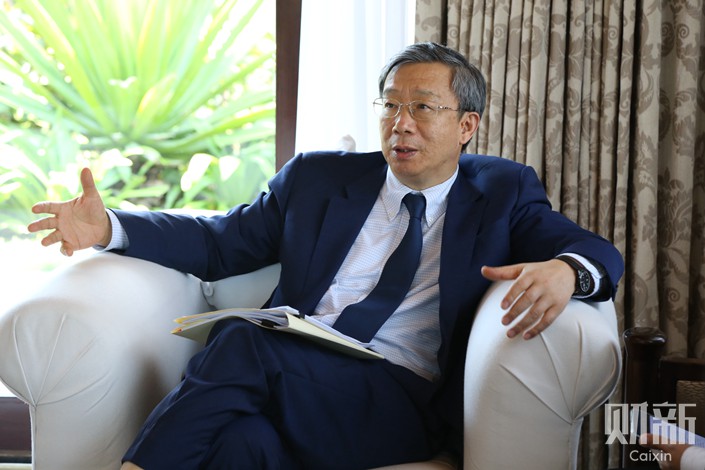Exclusive: Central Bank Governor Says China Will Achieve 2018 GDP Target

China will achieve its growth target this year, and debt levels in the economy have stabilized, People’s Bank of China (PBOC) Governor Yi Gang said in an exclusive interview with Caixin.
Yi’s comments came two days after the International Monetary Fund (IMF) lowered its 2019 growth forecast for China amid continuing trade tensions with the U.S. The target for this year’s annual economic growth, set by the government at the beginning of 2018, can be met, said Yi, speaking to Caixin on the sidelines of the World Bank Group and IMF meetings in Bali, Indonesia.
The Chinese central bank will focus on the domestic economy when making adjustments to its monetary policy, Yi also said, indicating that the PBOC’s decision-making will be influenced less than before by changes in the external environment such as recent interest rate hikes by the U.S. Federal Reserve.
The Fed has raised interest rates three times in 2018 so far, with another rate hike likely by the end of the year. But the PBOC has not been following with equivalent hikes, so spreads between the cost of U.S. and Chinese debt are narrowing. A narrower spread can lead to capital outflows and potentially weaken the yuan, which has already fallen 9% against the dollar in the past six months and is approaching a key psychological barrier of 7 per dollar.
Keeping rates low would avoid increasing the cost of borrowing, which could help support China’s slowing growth. “China’s policymakers are putting domestic growth as the priority,” according to a note from Macquarie analysts. “For the near term, however, liquidity easing would lead to more currency weakness.”
To prevent the yuan weakening further as the interest rate spreads narrow, China has to stabilize and increase confidence in its economy, Lu Ting, chief China economist with Nomura International, said to Caixin.
In March, China set a target of “around 6.5%” growth for 2018, but a campaign to curb debt growth and cut down on financial risks has seen key economic indicators, such as infrastructure investment expansion, fall to record lows. On Tuesday, the IMF lowered its 2019 growth projection for China to 6.2% from 6.4%, although it kept its forecast for 2018’s growth the same, at 6.6%.
Yi also expressed his confidence in the progress of this campaign to reduce financial risks. “The macro-leverage ratio has stabilized, the leverage ratio of state-owned enterprises continues to fall, and local government debts are controllable,” said Yi. “All these elements indicate that China has entered a period of high-quality development.”
“We’ve talked about deleveraging for many years. Now, leverage has stabilized. This is a significant change,” Yi said.
With weakening growth and uncertainties over trade, smoothing the economic impact of de-risking “is a very difficult act of judgment that policymakers in China have to struggle with,” Vitor Gaspar, director of the IMF’s fiscal affairs department, told reporters at a separate briefing on its Fiscal Monitor, a report that tracks the state of countries’ public finances, on Wednesday.
Liu Jiefei contributed to this report.
Contact reporter Ke Baili (bailike@caixin.com)
- 1Cover Story: China Carves Out a Narrow Path for Offshore Asset Tokenization
- 2Drownings Shake Chinese Enthusiasm for Travel to Russia
- 3Over Half of China’s Provinces Cut Revenue Targets
- 4Li Ka-Shing’s Port Empire Hit by Forced Takeover Amid Panama Legal Dispute
- 5In Depth: China’s Mutual Fund Industry Faces Overhaul After a Banner 2025
- 1Power To The People: Pintec Serves A Booming Consumer Class
- 2Largest hotel group in Europe accepts UnionPay
- 3UnionPay mobile QuickPass debuts in Hong Kong
- 4UnionPay International launches premium catering privilege U Dining Collection
- 5UnionPay International’s U Plan has covered over 1600 stores overseas






